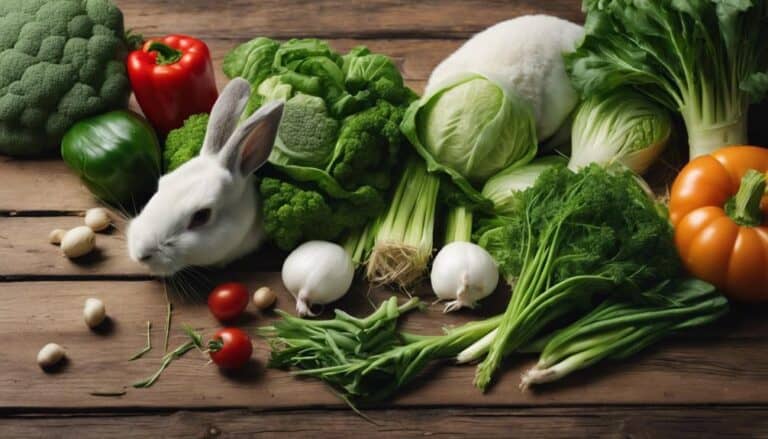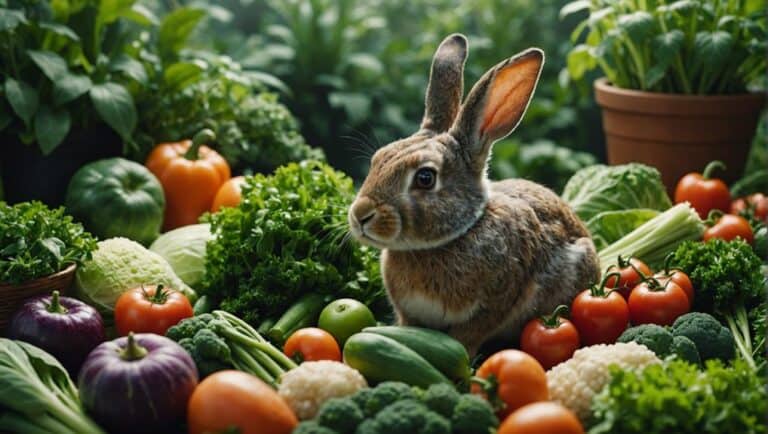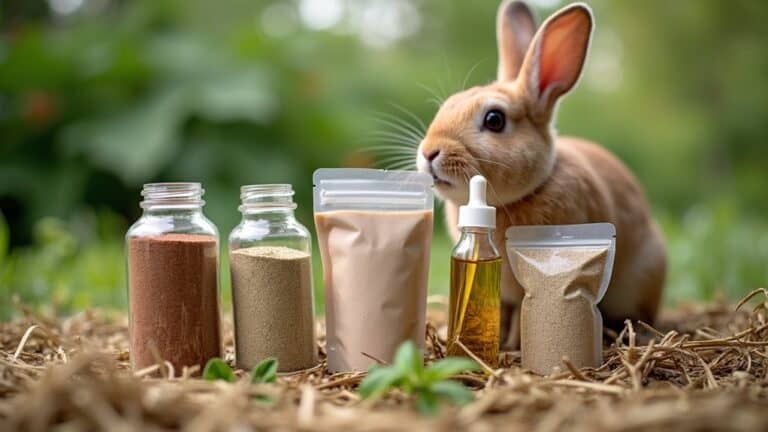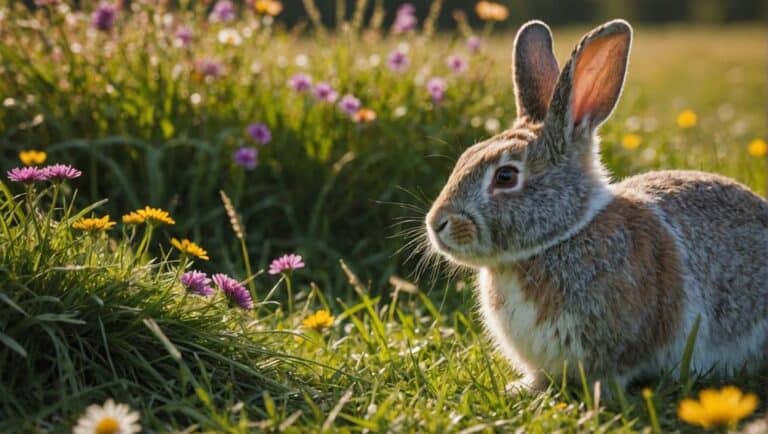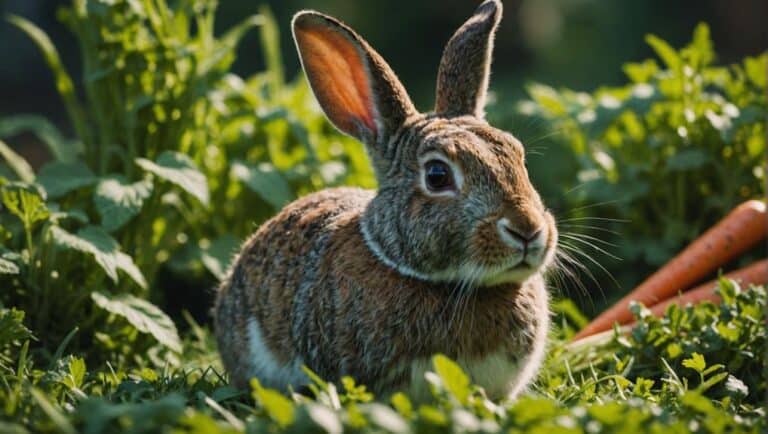When it comes to your dwarf rabbit's diet, understanding their nutritional needs is vital for their health and happiness. You'll find that high-fiber foods, particularly quality grass hays, play a significant role in their daily intake. Fresh, leafy greens can enhance their hydration and provide essential nutrients. But what about the right balance of pellets and the occasional fruit treat? It's not just about what they eat; it's also about how much. Let's explore the finer details of their dietary requirements and discover how to keep your rabbit thriving.
Contents
Importance of Optimal Nutrition
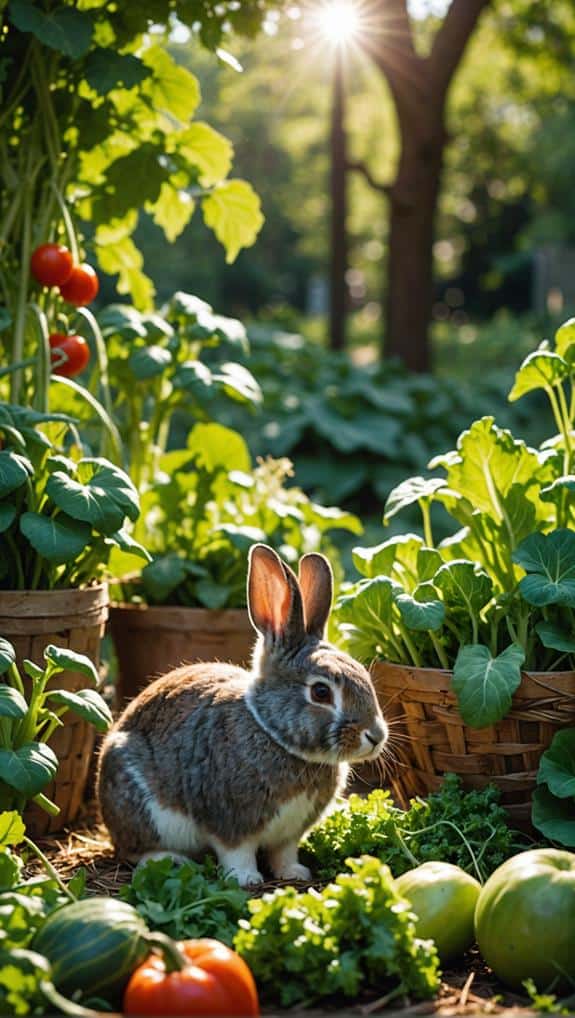
Ideal nutrition is fundamental for the health and well-being of your dwarf rabbit. A balanced diet should primarily consist of high-fiber foods, making up 85%-90% of their intake. This high fiber content, primarily sourced from hay, is essential for maintaining good digestion and dental health.
Proper nutrition is essential for overall health and well-being; you'll want to make certain your rabbit gets ample fresh, leafy greens daily about the size of their paw to provide important vitamins and minerals. However, be cautious with high-sugar vegetables, as they can lead to digestive problems.
While hay and leafy greens are the foundation, you can include a small portion of pellets roughly one egg cup carefully chosen and minimized to prevent obesity and further digestive issues. It's important to monitor your rabbit's food intake and offer a varied diet to prevent selective feeding. This guarantees they receive the balanced nutrition necessary for their growth and overall health.
Regular veterinary consultations are crucial for adjusting their diet based on age and health conditions. By prioritizing ideal nutrition, you're setting the stage for a happy, healthy life for your dwarf rabbit.
Best Hay for Dwarf Rabbits
Choosing the right hay is essential for your dwarf rabbit's health and well-being.
High-quality grass hays like timothy, orchard, and brome grass provide important fiber that supports digestion and dental care. Additionally, hay constitutes 80-90% of a rabbit's diet, making it key for their overall wellness and gut health the importance of hay.
Types of Recommended Hay
When it comes to providing the best nutrition for your dwarf rabbit, selecting the right type of hay is essential. Good hay is fundamental for their digestive health and overall well-being. Timothy hay, especially the 3rd cutting, is one of the top choices. It offers the necessary fiber for digestion and helps maintain dental health. You should aim to provide this hay every day to keep your rabbit happy and healthy.
Additionally, hay serves as a primary fiber source crucial for digestive health and promotes mental stimulation and physical activity in rabbits, making it an indispensable part of their diet (importance of hay).
If your dwarf rabbit is sensitive, consider Orchard hay. It serves as an excellent allergy-friendly alternative while still delivering essential nutrients. While Alfalfa hay is rich in protein and calcium, use it sparingly as an occasional treat; too much can lead to obesity and bladder issues.
Additionally, you can explore alternative grasses like brome and crabgrass. These can effectively lower your hay costs while ensuring your dwarf rabbit receives the fiber it needs.
Remember, greener hay varieties not only look appealing but also indicate higher vitamin D and essential nutrient content, which are pivotal for your dwarf rabbit's overall health.
Hay Quality Considerations
Ensuring the quality of hay is essential for your dwarf rabbit's health and happiness. High-quality hay should make up 85%-90% of their diet, providing the necessary high fiber content important for digestion and dental health.
When selecting hay, opt for varieties like timothy 3rd cutting and orchard hay. These options not only support your rabbit's overall well-being but also help maintain their dental health by promoting natural wear on their teeth.
It's imperative to be vigilant about hay quality. Always check for dust, weeds, and thorns, as poor-quality hay can lead to respiratory issues and other health complications.
Greener hay varieties are preferable, indicating higher Vitamin D and nutrient content. While alfalfa hay is rich in nutrients, it should only be given as an occasional treat due to its potential to cause obesity and health issues if fed regularly.
For rabbits sensitive to timothy hay, orchard hay serves as a fantastic allergy-friendly alternative, ensuring they receive the required fiber without adverse reactions.
Hay's Nutritional Benefits
To maintain ideal health, dwarf rabbits rely heavily on the nutritional benefits of high-quality hay. This crucial component of their diet provides the fiber necessary for proper digestion and supports their delicate digestive systems. Timothy hay, especially the 3rd cutting, and orchard hay are excellent choices. These hays aren't only rich in nutrients but also allergy-friendly, promoting overall well-being.
While alfalfa hay is highly nutritious, it should only be given as an occasional treat due to its high protein and calcium content, which can lead to obesity and other health problems if consumed in excess.
You'll want to verify the hay you provide is fresh, free from dust or mold, and devoid of weeds or thorns—this helps maintain dental health and prevents respiratory issues.
Additionally, access to greener hay indicates a higher Vitamin D content, crucial for your dwarf rabbit's health.
Leafy Greens and Their Benefits
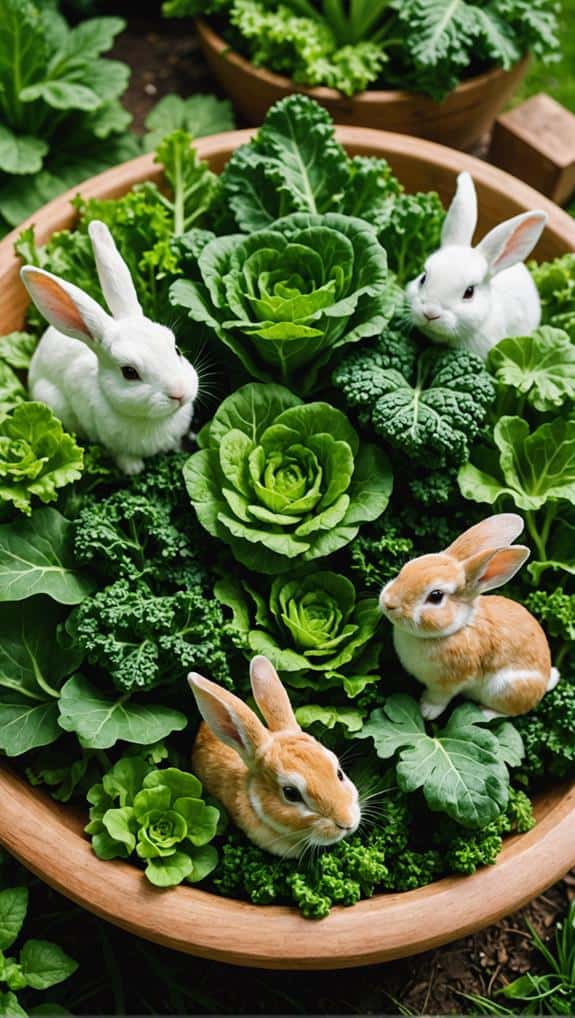
Leafy greens are an essential part of your dwarf rabbit's diet, providing crucial vitamins and minerals needed for superior health. A daily serving of approximately one cup guarantees that your rabbit receives the nutrients required for ideal well-being. Incorporating a variety of vegetables helps prevent digestive issues and encourages hydration.
Consider these recommended leafy greens for a balanced diet:
- Spinach: Rich in iron and vitamins A and C.
- Kale: Contains calcium but should be limited for less active rabbits.
- Parsley: Offers antioxidants and is a great source of hydration.
- Basil: Adds flavor and essential oils beneficial for health.
- Romaine lettuce: Provides fiber and helps maintain digestive health.
Rotating these greens weekly can enhance nutritional intake and minimize selective feeding behaviors. When introducing new leafy greens, do it gradually to prevent stomach upsets and guarantee a smooth changeover.
Choosing the Right Pellets
Selecting the right pellets is essential for your dwarf rabbit's overall health and well-being. When you're choosing rabbit food, opt for high-quality pellets that contain at least 18% fiber and 12-14% protein for adult rabbits.
For younger rabbits, look for pellets with around 16% protein to support their healthy growth and digestion.
It's important to avoid pellets that contain alfalfa for adult rabbits, as the high protein content can lead to obesity and various health issues. Reserve alfalfa pellets for young bunnies or offer them as an occasional treat.
Instead, search for pellets made mainly from grass hay, such as timothy or brome. This guarantees their diet aligns with natural feeding habits and helps prevent selective eating.
Be cautious of commercial pellets that may include harmful additives or fillers, as these can jeopardize your rabbit's health, potentially leading to digestive problems or obesity.
When introducing a new pellet type, gradually shift over 14-28 days to avoid gastrointestinal upset. Always monitor any changes in behavior or health during this adjustment period to confirm your rabbit thrives on their new diet.
Fruits: Treats in Moderation
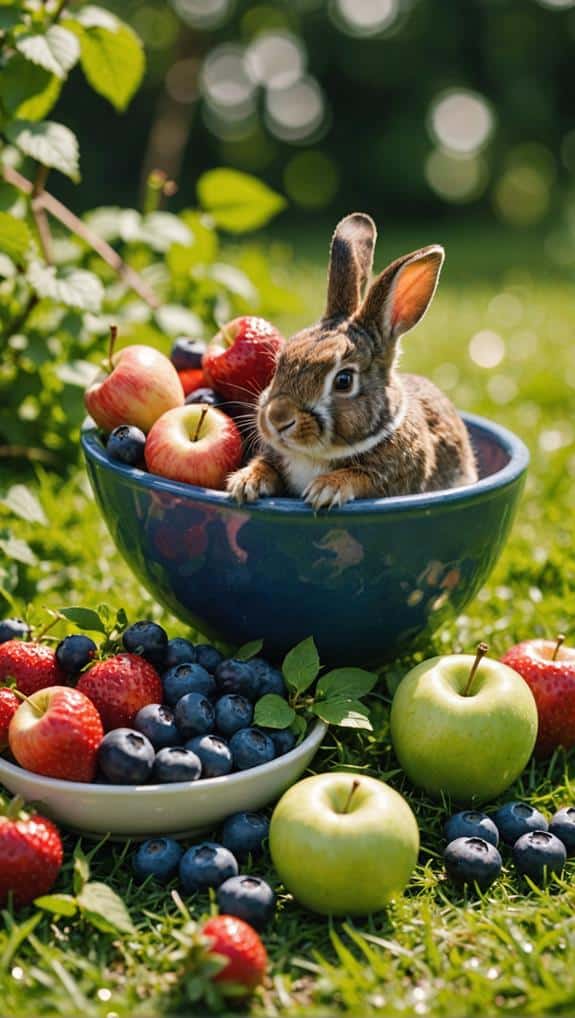
How can you safely introduce fruits into your dwarf rabbit's diet? When it comes to fruits, remember that they should be treats in moderation due to their high sugar content. Offering fruits sparingly helps prevent digestive issues like soft droppings, which can be distressing for your bunny.
Here are some safe fruit options to take into account:
- Apples (without seeds)
- Berries (such as strawberries or blueberries)
- Melons (like cantaloupe or watermelon)
- Peaches (pit removed)
- Pears (in small amounts)
Keep portion sizes in mind; an apple slice should be about the size of your rabbit's front paw, and fruits should make up no more than 10% of their daily diet.
As your dwarf rabbit ages, you may gradually increase fruit portions, but do so carefully while monitoring their health and behavior. Always verify that fruits are fresh and thoroughly washed before serving.
Consult with a veterinarian for personalized guidance tailored to your rabbit's specific dietary needs. By providing fruits mindfully, you contribute to a balanced diet that keeps your dwarf rabbit healthy and happy.
Foods to Avoid for Health
To guarantee your dwarf rabbit stays healthy, it's vital to be aware of the foods that can be harmful or toxic. First off, avoid muesli mixes, as they encourage selective feeding that can lead to obesity and digestive issues. High-carb foods like bread and pasta should never enter your rabbit's diet; they severely disrupt the digestive system and contribute to health problems.
It's important to exclude toxic vegetables entirely; potatoes and onions can lead to serious health consequences. Additionally, steer clear of sweetened commercial treats and high-fat nuts, as these can promote weight gain and other health complications.
You should also be cautious with leafy greens—excessive amounts of iceberg lettuce offer little nutritional value and may cause digestive upset.
Instead, focus on providing a balanced diet rich in hay, fresh vegetables, and limited treats in moderation. By knowing the foods to avoid for health, you're taking a considerable step in ensuring your dwarf rabbit leads a happy, healthy life.
Always prioritize their well-being and remember that what you feed them greatly impacts their overall health.
Portion Control and Serving Sizes
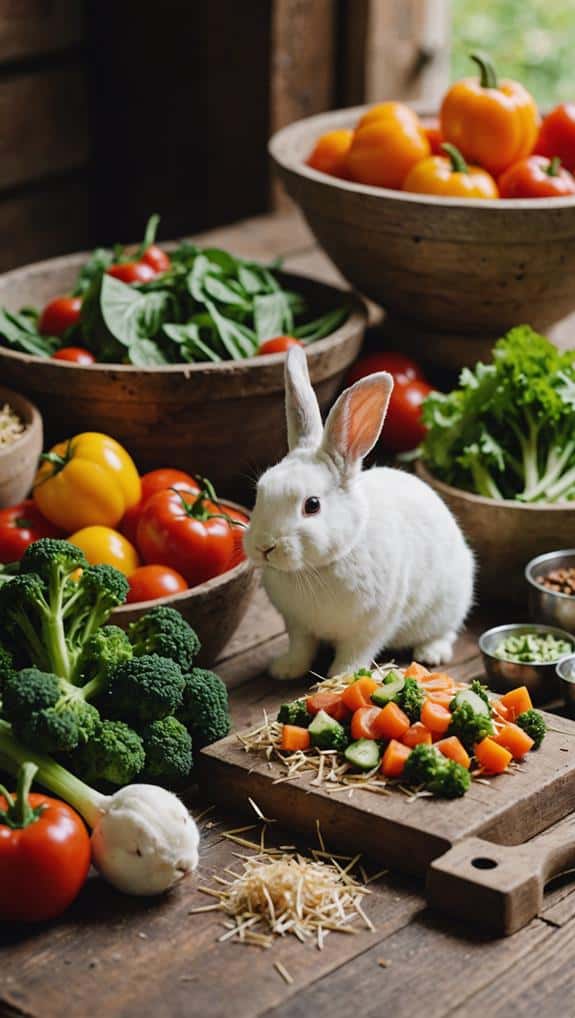
Maintaining proper portion control and serving sizes is essential for keeping your dwarf rabbit healthy and happy. By understanding how much your rabbits eat, you can guarantee they receive balanced nutrition while avoiding weight issues.
Here are some key guidelines to follow:
- Limit fruit treats to small sizes, like an apple slice the size of your bunny's front paw, to prevent excessive sugar intake.
- Offer about one cup of leafy greens daily, rotating different types weekly for varied nutrients.
- Provide approximately one egg cup of high-fiber pellets per rabbit each day, keeping their weight in check and supporting digestive health.
- Adjust serving sizes gradually as younger bunnies grow, since they've a lower ability to absorb sugar.
- Regularly observe your rabbit's reactions to new foods and adjust portions accordingly to maintain a balanced diet.
Monitoring Health and Dietary Needs
Monitoring your dwarf rabbit’s health and dietary needs is essential for maintaining their well-being. Regular check-ups with a veterinarian familiar with small animals can help identify any potential health issues early on. Additionally, understanding the specific requirements of your rabbit, such as their preferred types of hay and vegetables, is crucial for their happiness and longevity. For those interested in learning more about this delightful breed, the Netherlands dwarf rabbits overview provides valuable insights into their characteristics and care needs.
Regularly track their weight and eating habits, as these can reveal important insights into their overall health.
Don't hesitate to consult with a veterinarian to guarantee your rabbit receives the tailored care they need.
Weight Management Strategies
Keeping your dwarf rabbit at a healthy weight requires a proactive approach that involves regular monitoring of their health and dietary needs. Effective weight management is vital to prevent obesity, which can lead to serious health issues like heart disease and joint problems.
To guarantee your rabbit thrives, consider the following strategies:
- Regularly monitor your dwarf rabbit's weight and adjust food intake as needed.
- Observe your rabbit's droppings and overall behavior for sudden changes, as these may indicate dietary imbalances or health concerns.
- Gradually switch between different types of food over a 14-28 day period to prevent digestive upset.
- Provide constant access to fresh water and high-quality hay, essential for hydration and digestive health.
- Consult a veterinarian regularly to tailor a diet plan that accommodates your rabbit's age, weight, and health status.
Dietary Observation Techniques
Understanding your dwarf rabbit's dietary needs is key to guaranteeing their well-being. Start by regularly monitoring your rabbit's weight to keep it within a healthy range. Adjust food portions as necessary to prevent obesity or undernutrition.
It's important to observe your rabbit's eating habits and droppings; any changes in consistency or quantity can signal digestive issues or dietary imbalances.
Whenever you introduce new foods to the diet, keep a consistent log to document your rabbit's reactions. Pay attention to any changes in behavior or health, as these can help you track individual responses to dietary changes, which is crucial for their unique digestive system.
Additionally, guarantee your rabbit has constant access to fresh water. Watch for signs of dehydration, such as lethargy or concentrated urine, to assess hydration levels effectively.
Your observations are essential in maintaining your rabbit's health and happiness. Always be proactive, as these simple yet effective dietary observation techniques can lead you to make informed decisions that promote their overall well-being.
Veterinary Consultation Importance
Regular veterinary consultations play an essential role in guaranteeing your dwarf rabbit's dietary needs are met effectively. By scheduling check-ups every 6-12 months, you can monitor your rabbit's weight, diet, and overall health, which is vital for making timely dietary adjustments.
If you notice any changes in your rabbit's eating behavior or droppings, consult your vet immediately to prevent potential complications, including dental disease.
Your veterinarian can provide personalized dietary recommendations tailored to your rabbit's unique needs. This includes the appropriate type and amount of rabbits pellets, hay, and fresh vegetables.
Maintaining an open line of communication about your rabbit's diet fosters better management of their health and lifestyle.
Here are some key reasons to prioritize veterinary consultations:
- Identify individual dietary needs based on age and health status.
- Monitor for potential dietary issues through eating behavior and droppings.
- Guarantee proper nutrition specific to dwarf rabbit breeds.
- Adjust diets according to ongoing health concerns.
- Minimize risks associated with abrupt dietary shifts.
Final Thoughts
In summary, providing your dwarf rabbit with an ideal diet is essential for their health and happiness. Remember, "you are what you eat," so focus on high-fiber hay, fresh greens, and limited treats. Regularly monitor their weight and health with your veterinarian to guarantee they're thriving. By prioritizing their nutritional needs, you not only support their well-being but also deepen the bond you share. A well-fed rabbit is a happy rabbit, and that joy is truly rewarding.

